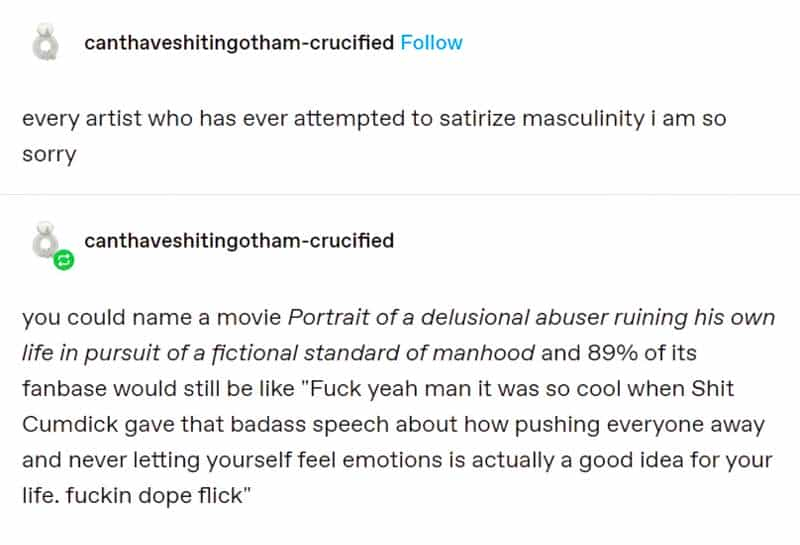HATE SINK CHARACTERS IN BREAKING BAD
A hate sink character refers to a character the writers mean for audiences to hate. Importantly, audiences love to hate them. Who do you love to hate on Breaking Bad? In contrast, are there characters you find outright annoying? If so, do you feel they are written to be annoying?
AN ACTOR PLAYING A NON-ACTOR
Bryan Cranston who plays Walter White is an excellent actor. Complicating his task, Cranston is at times required to play a man who is not a professional actor. This is Walt covering his tracks. Do you think Walter White becomes a better actor as he becomes more adept at switching between his personas as Walt and Heisenberg? When is he worst at acting? When is he best at it?
THE EAVESDROPPING TROPE
Oftentimes in stories, one character overhears something and because they don’t have the full context, and get it wrong, leading to some interesting dramatic results for the audience. The writers of Breaking Bad also used this trope, and variations on it. When did they use it? Did they pull it off?
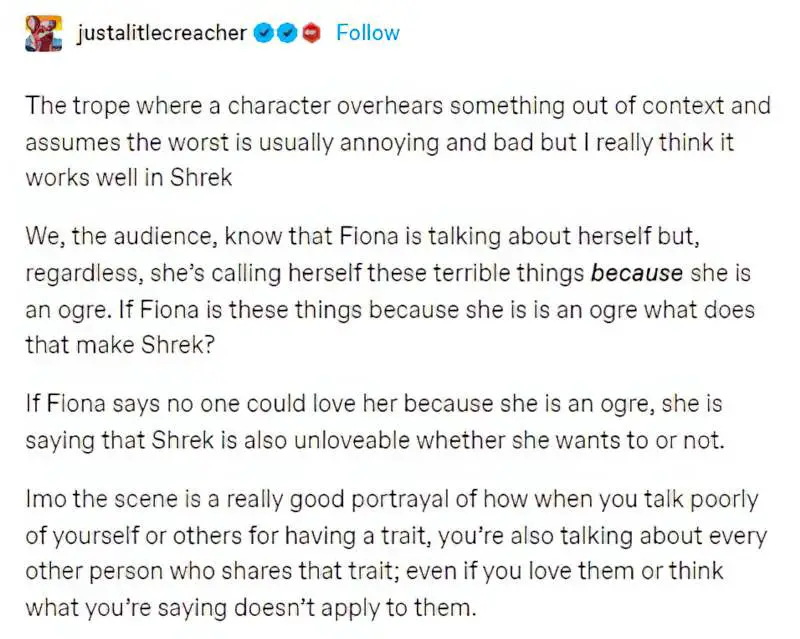
WALT AS KING OF CHAOS
Below is a character assessment of Kermit the Frog, described as ‘the frog that creates circumstances’. To what extent do you think Walter White is a similar character? Do you think there were occasions when he actively enjoyed getting himself and others into life-threatening circumstances?
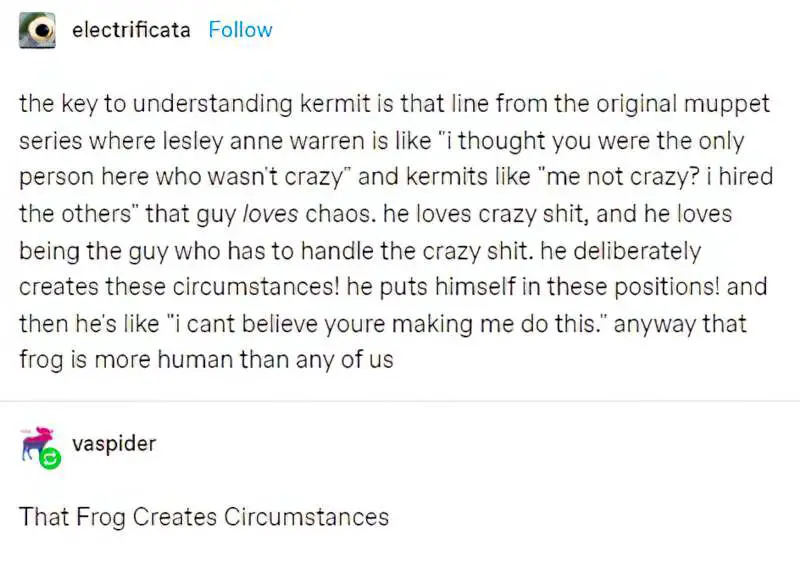
WALT’S STRENGTHS AND WEAKNESSES
Walter White is good at being a chemist, no question. But do you think Walter also mastered the job of being a drug lord?
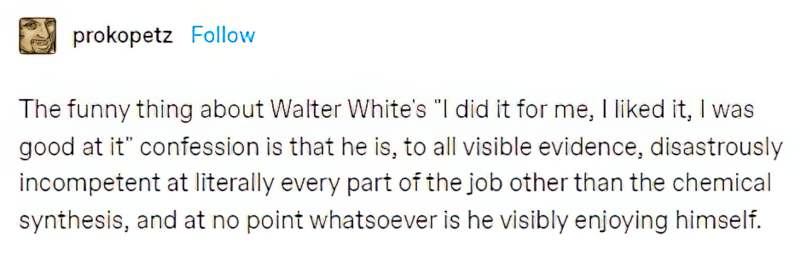
See also: Walter White Character Study
GUS FRING’S STRENGTHS AND WEAKNESSES
Do you think it’s possible to be a good boss to some employees and a bad boss to others? Do you think Gus Fring was a ‘good boss’ by any measure?
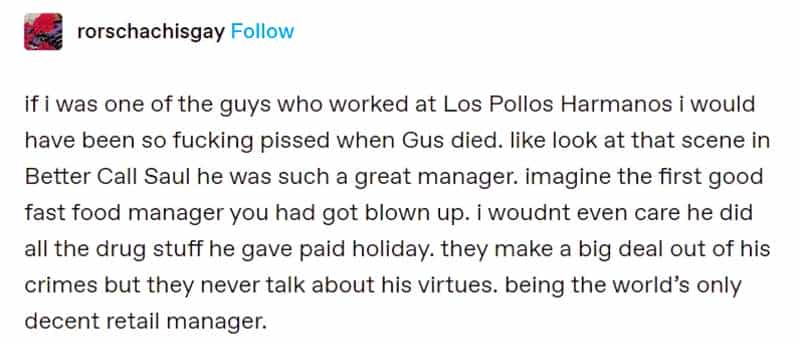
SKYLER’S CHARACTER ARC
Skyler gets her own “Breaking Bad” character arc. At what point do you feel Skyler made the moral decision to break bad rather than turn Walt in to the authorities? Do you feel that, in the end, Skyler was just as bad as Walt, or is she less culpable?
For my thoughts on this see: Empathy In The Breaking Bad Pilot.
MARIE’S KLEPTOMANIA
Hank’s wife Marie turns to a fantasy world when she is under pressure, which involves stealing various small items as mementoes. How does this subplot involving Marie metaphorically reflect the main plot?
See: The Shoplifting Trope in fiction is highly gendered
YOUR FAVOURITE BADDIE
Each season gives us a new bad guy aside from Walt. Out of Tuco, Fring, Mike and Jack Welker, who is your favourite? What, in your opinion, makes for a highly watchable baddie? If you enjoy some of these guys more than others, what makes it so?
See: Must fictional heroes be likeable?
BREAKING BAD AS MODERN FAIRY TALE
Breaking Bad is a neo-Western crime drama with heist features. But it also draws on a genre much older: Fairy tales. Think back to fairy tales from your childhood. Do you recognise any of the plots?
See: Fairytale Tropes in Breaking Bad
BROCK AND THE POISON
Breaking Bad is generally very easy to follow, with the exception of Brock and the poisoning plot line, which requires more from viewers, especially as it spans several seasons. At what point did you realise what was happening? Looking back, what clues did the writers give us?
(If you never did manage to follow it, this is the best Reddit thread I’ve seen about it.)
THE COLOUR GREEN
Colour can symbolise many things. In Breaking Bad, what are those things?
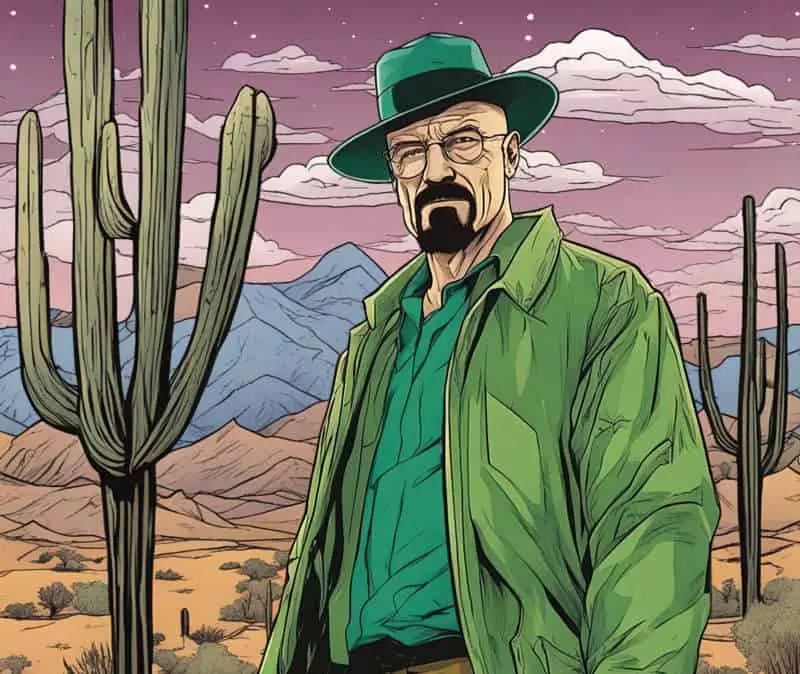
BREAKING BAD AND SOCIOPATHS
Since we’re allowed to armchair diagnose fictional characters without repercussion, which of the baddies on Breaking Bad are sociopaths, do you think? Do you include Walter White among them?
Sociopaths and psychopaths refer to the same thing, also known as ‘malignant narcissists’. For more on psychopaths in fiction, and an expanded explanation of narcissism, see here. (After reading, have you changed your mind?)
JESSE PINKMAN
Originally, Jesse Pinkman was never written to be an enduring character. Rather, he was written to help Walt start on his drug empire journey. But Aaron Paul did such a good job of acting Jesse he became Walt’s reflection character.
A reflection character is a character type that includes a main characters’ pals, allies, partners, co-workers, teammates, and sidekicks. They comment on the main character’s journey and are often along for the same ride. Personality wise, reflection characters tend to be very different. Jesse highlights Walts strengths and weaknesses.
In what ways does Jesse Pinkman make the perfect reflection character for Walter White? How does Jesse illuminate aspects of Walt’s morality?

BREAKING BAD AND DEATH
How do you think Walt’s attitude towards his own mortality changed over the course of the seasons, or how did it stay the same? How did Walt’s attitude differ from and align with the attitudes of other characters?
Years ago, Charlie, a highly respected orthopedist and a mentor of mine, found a lump in his stomach. He had a surgeon explore the area, and the diagnosis was pancreatic cancer. This surgeon was one of the best in the country. He had even invented a new procedure for this exact cancer that could triple a patient’s five-year-survival odds–from 5 percent to 15 percent–albeit with a poor quality of life. Charlie was uninterested. He went home the next day, closed his practice, and never set foot in a hospital again. He focused on spending time with family and feeling as good as possible. Several months later, he died at home. He got no chemotherapy, radiation, or surgical treatment. Medicare didn’t spend much on him.
HOW DOCTORS DIE
It’s Not Like the Rest of Us, But It Should Be
BREAKING BAD AND MASCULINITY
Do you think Breaking Bad succeeded, overall, in critiquing toxic forms of masculinity?
